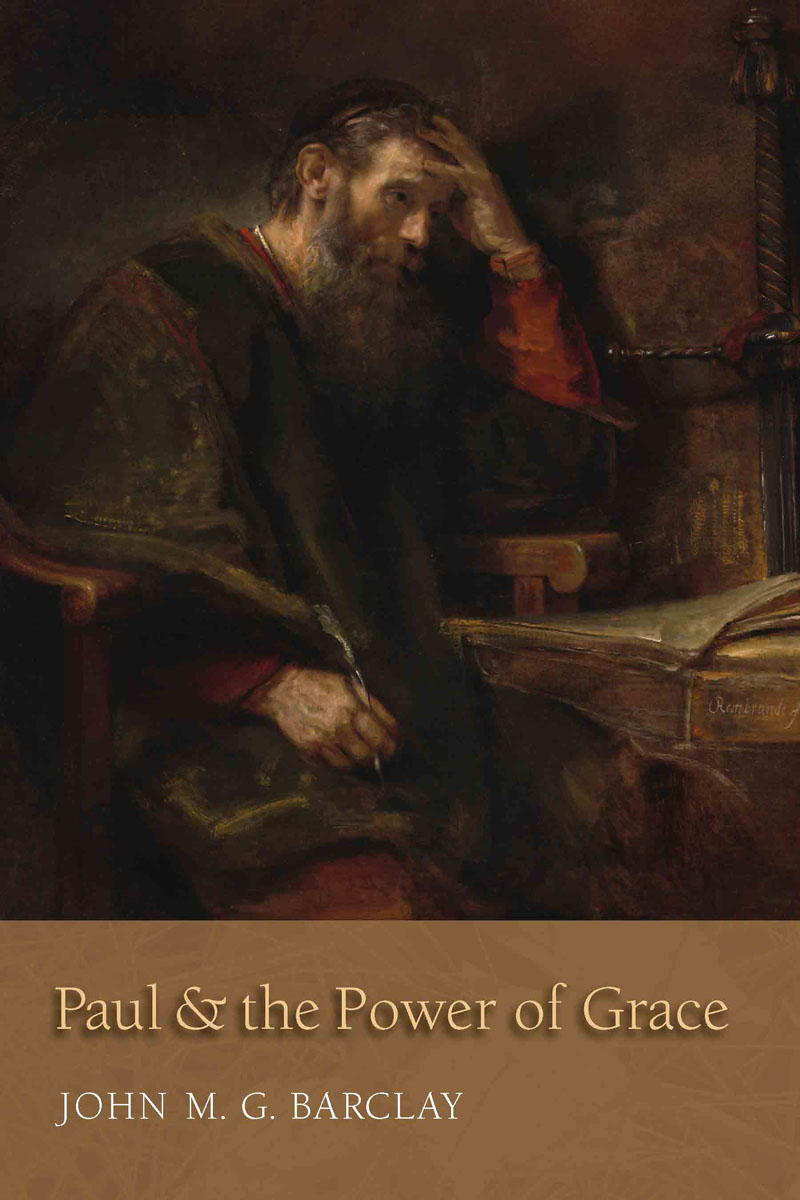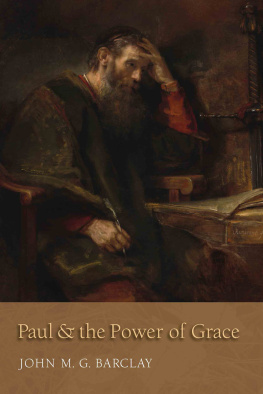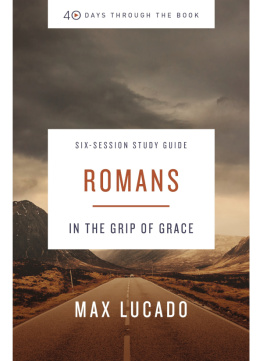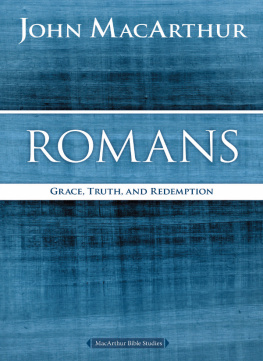

Wm. B. Eerdmans Publishing Co.
4035 Park East Court SE, Grand Rapids, Michigan 49546
www.eerdmans.com
2020 John M. G. Barclay
All rights reserved
Published 2020
Printed in the United States of America
26 25 24 23 22 21 20 1 2 3 4 5 6 7
ISBN 978-0-8028-7461-0
Library of Congress Cataloging-in-Publication Data
Names: Barclay, John M. G., author.
Title: Paul and the power of grace / John M. G. Barclay.
Description: Grand Rapids, Michigan : William B. Eerdmans Publishing Company, 2020. | Includes bibliographical references and index. | Summary: A condensed and developed version of Barclays previous book, Paul and the Gift, with extended applications to the other letters of Paul and to select contemporary issuesProvided by publisher.
Identifiers: LCCN 2020020627 | ISBN 9780802874610
Subjects: LCSH: Bible. Epistles of PaulTheology. | Grace (Theology)Biblical teaching.
Classification: LCC BS2655.G65 B375 2020 | DDC 227/.06dc23
LC record available at https://lccn.loc.gov/2020020627
In memory of J. Louis Martyn (19252015)
Contents
Preface
A few years ago, I wrote a heavy-weight book called Paul and the Gift (Grand Rapids: Eerdmans, 2015), which explored Pauls theology of grace in Galatians and Romans; for that task I used resources from the study of gifts in the discipline of anthropology, and I explored crucial episodes in the history of interpretation of Paul. That book has been widely discussed by both New Testament scholars and theologians, and many have urged me to write a shorter version for a broader audience. As I reflected on this suggestion, I found I also wanted to explore more features of the terrain of gift. At the same time reviews, debates, and discussions of Paul and the Gift pressed me to develop my arguments, to extend their scope, and to relate the gift-theme more explicitly to the contemporary world. This new book is entitled Paul and the Power of Grace as a reflection of its goal to bring out more fully the dynamic in Pauls theology of grace and of the resources it offers for practice today.
This book thus performs two tasks. First, in ) how the ideas in this book might offer a resource for handling some contemporary issues.
Thus, this new book as a whole offers both an accessible summary of Paul and the Gift and an extension and development of that work. (It is not, however, the major follow-up volume promised in Paul and the Gift, regarding gift-exchange and the formation of community: that is an ongoing work-in-progress.)
It has been a challenge to strike the right balance between repeating myself, saying some things differently, and adding some things new. Those who have already read Paul and the Gift will find the first nine chapters of this book very familiar, but I have written this new book primarily for those who have not read Paul and the Gift, or who found it intimidatingly long. (Conversely, those who find this book frustratingly brief can go to the longer and fuller version in Paul and the Gift!)
I am very grateful to the publishers, Eerdmans, for their patience in waiting for this book, and especially to my editors (in succession) Michael Thomson and Trevor Thompson, and to the expert project editor, Linda Bieze, and copy editor, Cody Hinkle. I am indebted to friends who kept urging me to write it, of whom Paul Trebilco, Todd Brewer, and Jonathan Linebaugh should get special mention. The latter two also generously read through the whole manuscript and offered many valuable suggestions for improvement, while Logan Williams, who did likewise, also picked up many an error in content or prose. I am immensely grateful to them all.
I dedicate this book to the memory of J. Louis Martyn, an outstanding New Testament scholar and profound theologian of grace, from whom I learned much that undergirds this book.
Prologue: What Do We Mean by Grace?
In June 2019, a remarkable event took place on the Pyramid Stage of Glastonbury Festival in the UK. The British rapper Stormzy took to the stage and led a huge crowd in a rendition of his hit song Blinded by Your Grace. The lyrics speak of the grace of God given to the unworthy and were sung with real emotion.
Moreover, they were taken up with enthusiasm by the rapturous festival crowd. What was striking was how much resonance they seemed to have with this audience, even in the secularized youth culture of modern Britain.
Those with ears to hear will pick up the echoes of John Newtons famous hymn, which is still deeply embedded in the Western collective consciousness:
Amazing gracehow sweet the sound
That saved a wretch like me.
I once was lost, but now am found,
Was blind, but now I see.
The imagery in the lyrics of Stormzy and Newton echo Jesuss parable of the prodigal son, lost and broken (Luke 15:1132), and accounts in the New Testament gospels of Jesuss healing of the blind (e.g., John 9:134). But the term grace, rarely used in the Gospels, is an echo of Paul, whose letters are full of references to grace. More accurately, they are full of references to Gods favor, gift, or benefaction, using a variety of Greek terms including the word charis, which we normally translate grace. Paul sums up the effect of the life, death, and resurrection of Jesus as the grace (charis) of our Lord Jesus Christ (2 Cor 8:9); where sin abounded, grace (charis) super-abounded Sinful human beings have been justified as a gift, by his [Gods] grace (charis), through the redemption that is in Christ Jesus (Rom 3:24). Paul says his converts were called in charis (Gal 1:6), and the same is true of Paul (Gal 1:15). By the charis of God I am what I am, and his charis toward me was not in vain; rather, I worked harder than them allnot I, but the charis of God with me (1 Cor 15:10). By contrast, to be disjoined from Christ is to fall from charis (Gal 5:4).
What did Paul mean by this word charis, and how is it related to other terms for gift (and the verb, to give), which are common throughout his letters? Charis is an ordinary term in the Greek of Pauls day, not loaded with any special theological meaning. It means an act (or attitude) of favor or benevolencenot a special kind of gift, just any favor or benefit (see further, ). As we shall see, most gifts and benefits in the ancient world were distributed discriminately to fitting or worthy recipients. In Christian theology, however, charis (and its Latin translation, gratia) acquired a distinctive tenor: they came to mean a favor or gift given to the undeserving. That is how we normally hear the term grace now: it depicts a benefit or gift given to an unfitting or helpless recipientin Newtons terms, a wretch. Is that what is meant by Paul? Did he endue ordinary words for gift with this special meaning? If so, how did charis and other gift-terms acquire the sense of an undeserved gift? And what difference did that make?
Grace has often been supplemented with adjectives or qualifiers, designed to clarify its meaning or to maximize its force. The Protestant Reformers of the sixteenth century insisted that salvation is by grace alone. What did they mean to exclude by that phrase, and why did it matter to them? In fact, both before and after their time, Christians have often spoken of pure grace, sheer grace, or free grace. But pure from what? Or free of what? What is the point of this kind of emphasis?
Next page












